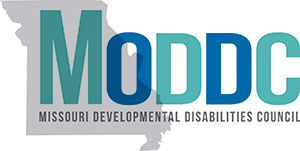Missouri Developmental Disabilities Council Public Policy Platform
The Missouri Developmental Disabilities Council and similar Councils in all 50 states are established by PL 106--402 to assure that individuals with developmental disabilities and their families participate in the design of and have access to needed community services and supports that promote self-determination, independence, productivity, and integration and inclusion in all facets of community life. The Councils are charged with accomplishing this work through advocacy, capacity building, and systems change activities. The Missouri Developmental Disabilities Council advocates on behalf of individuals with developmental disabilities and their families, but more importantly, provides leadership training and other resources that assist individuals with developmental disabilities and families in becoming effective legislative advocates for themselves and others.
The Council's Legislative Priorities:
While the Council follows all legislation and policies that may affect the lives and services of individuals with developmental disabilities and their families, the following are the Council's priorities:
It is the goal of the Missouri Developmental Disabilities Council (MODDC) to advocate for items in the budget and legislation that will further impact these priorities. MODDC will advocate for policies and practices addressing the following areas:
Direct Care Workforce
- Ensure that all individuals with intellectual and developmental disabilities (I/DD) in Missouri have access to and receive quality care. This includes both direct and indirect supports that are responsive and inclusive. Direct Support Professionals (DSPs) provide the skilled care necessary for people with I/DD to live independently, work, and connect with their communities. However, lack of meaningful investment in DSP wages combined with competitive wages at other hourly jobs like fast food and retail has created a crisis.
- This leaves Missourians who qualify and need supports without staff to fill that position. These skilled members of the Missouri workforce provide the supports necessary for people with I/DD to live and work as independently as possible.
Least Restrictive Environment
- Missourians with I/DD have the right to full access to services, supports and community living in an integrated and minimally restrictive environment.
Voting Accessibility
- Voting is a fundamental right and the bedrock of our democracy. Therefore, Missouri must make sure that citizens – with and without disabilities – have a full, fair, and equal opportunity to vote accessibly and privately in local, state, and national elections.

